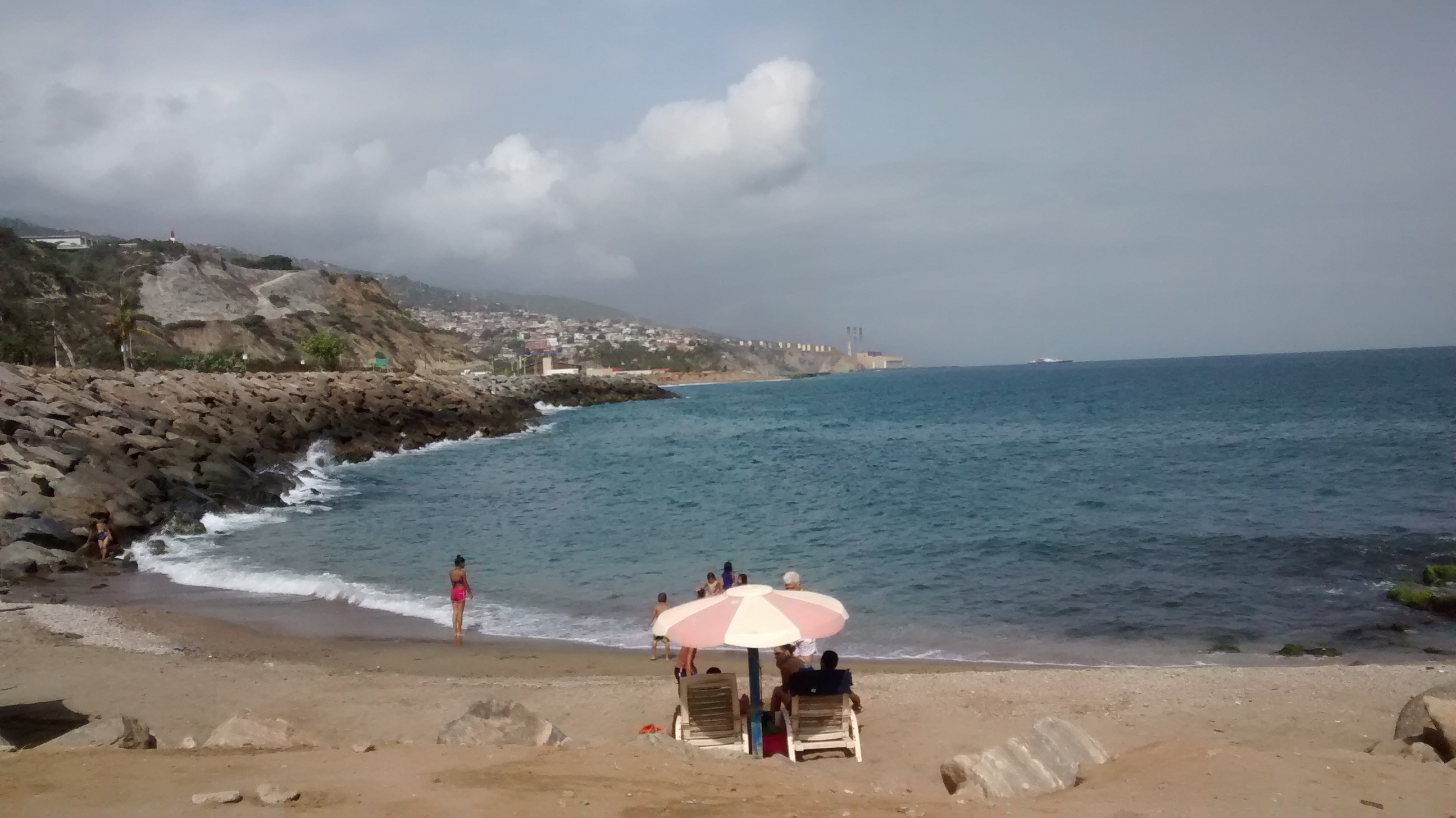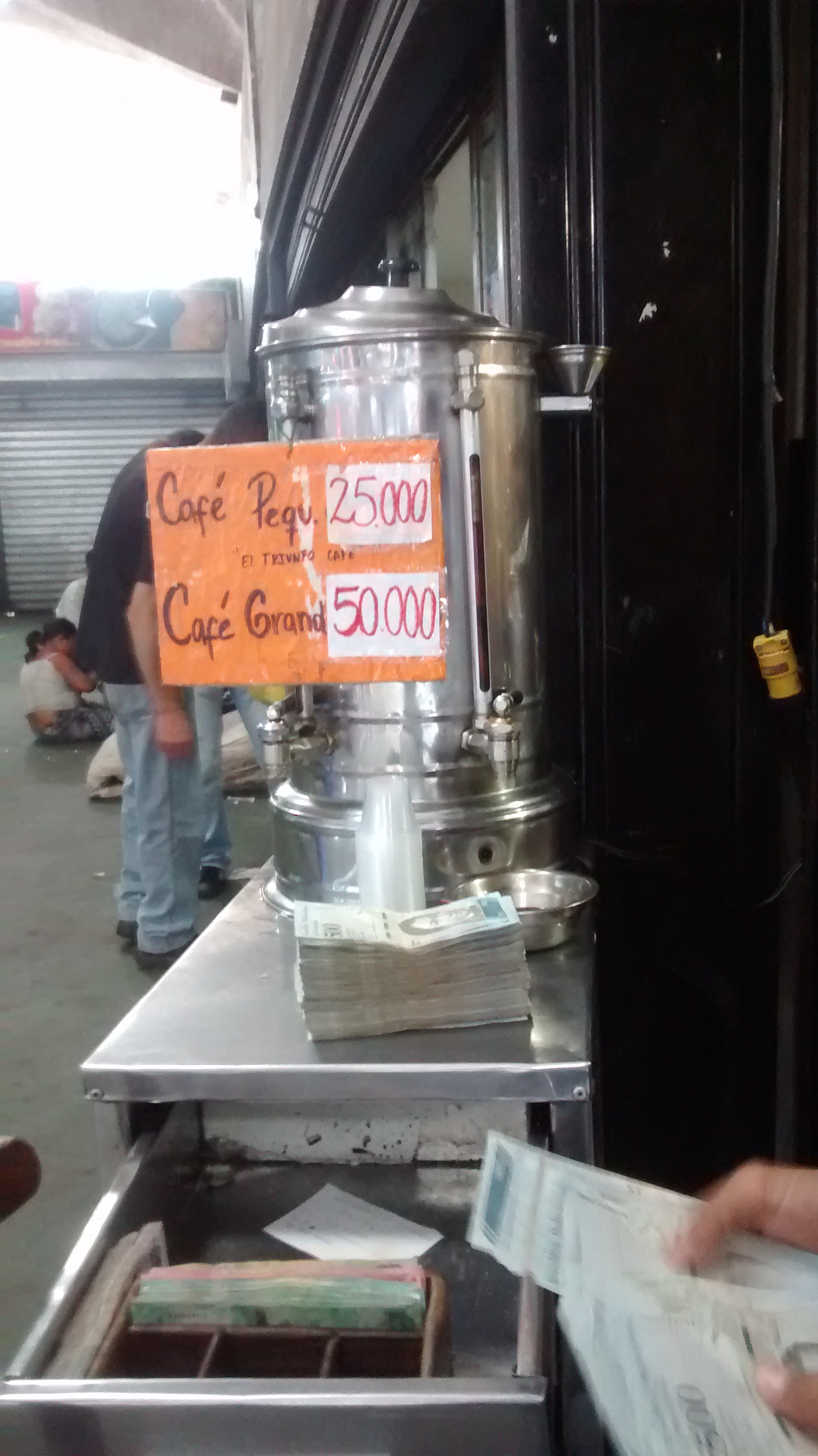Ingresa o regístrate acá para seguir este blog.
@wwaycorrigan
During my recent 16-day visit to Venezuela I had a host of people asking me “What’s it like ‘for real’?” I’m still getting asked that since my return.
Via an article in The Irish Times I did touch on a number of the everyday issues that Venezuelans are currently facing.
Here, I want to describe things from the point of view of entering the country overland as a tourist, which is effectively what I did.
Visa issues in Colombia meant I had to do a border-run and while I could have opted for Ecuador, Venezuela appealed far more to the adventurer/journalist/reporter in me. From that perspective it was like having the World Cup on my doorstep. I couldn’t ‘not go’, especially now that I had the visa ‘excuse’.
Don’t go
For sure, it wasn’t a decision I took lightly. Not only was I strongly advised against it by a high-up diplomat friend at our Irish embassy in Mexico, but even some Venezuelan acquaintances here in Bogotá thought it wasn’t the best idea. On top of that, there were the daily news reports on Colombian media that made the place seem akin to hell on earth. Only a lunatic would consider a ‘holiday’ there, especially doing it overland.
What made me feel a little bit more relaxed about going were the messages from my friend Yessi in Caracas. I’d stayed with her and her family for my previous visit back in December 2015.
‘It’s not that bad here.’
This time Yessi told me that while the situation for Venezuelans on the ground was more desperate due to, amongst other things, the hyperinflation and food shortages, in terms of security it wasn’t much different. And it was this, safety, that concerned me most.
So with Yessi’s somewhat reassuring messages and, more importantly in terms of giving me the final push to go, an arrangement that her cousin living in the Venezuelan border town of Colón would accompany me from Cúcuta across the ‘wild’ frontier, it was ‘Venezuela here I come’.
A cash-laden sitting duck
I was, I have to say, quite nervous thinking about what lay ahead during the 15-hour bus journey from Bogotá to Cúcuta. Arriving in Cúcuta, that apprehension worsened on receiving WhatsApp messages from Yessi’s cousin informing me that she couldn’t meet me in Cúcuta. What’s more, she asked me to go to a different border crossing to the one I was familiar with in San Antonio. It all sounded a little too complicated.
In any case, Erika from the money exchange office I used at the bus terminal in Cúcuta wasn’t sure if I could get my passport stamped at this other border crossing.*
I decided I’d go it alone to San Antonio.
‘It’s too obvious to hide money in your shoes.’
The ‘What am I doing?’ thoughts ramped up further still at the money exchange. On discovering I had ’emergency’ US dollars and euros on me, alongside a decent amount of Colombian pesos, Erika told me I’d have to hide everything exceptionally well.
She had stories of Venezuela’s infamous Guardia Nacional (National Guard) recently strip-searching people, looking for their hidden foreign currency, pretty much essential for any visitor to survive economically in Venezuela. I’d faced the intensity of the Guardia Nacional before, but the way Erika was speaking, it seemed like things were far worse. My suggestion to hide the cash in my shoes, as I’d done before, was “too obvious” she said.
Thus, for the good part of an hour we carried out surgery on the Lonsdale tracksuit bottoms I was wearing in order to make places to hide the cash.
Incidentally, based on Yessi’s advice, I only changed a small amount of cash, 50,000 Colombian pesos (COP), into bolívares. I received slightly less than 10 million, about 60 per cent of the value you’d get for doing a black market bank transaction, which is what most Venezuelans exchanging foreign cash do. They send the money to a Venezuelan bank account. Due to the shortage of bolívares, you don’t get the full value making cash-for-cash exchanges.
That aside, with the foreign currency hidden on my body as best we could, I took a shared taxi to the border.
Fiesta frontier
The first thing that struck me on arrival was how lively it was. Street vendors and tiendas blaring out music catering to thousands of people. It was like a little city of its own. This was completely different to the last time I crossed. It was more like a funeral procession back in 2015. The liveliness of it put me at ease, even if I did seem to be the only foreign face about.
After queuing for about 90 minutes to get my Colombian exit stamp — unfortunately on the Colombian side it’s the same queue for those entering and exiting, so I was lumped with all the Venezuelans going the opposite way — I walked across Puente Internacional Simón Bolívar, the bridge over the River Táchira, the divide between Colombia and Venezuela.
‘The National Guard was actually friendly.’
On my previous visits, the office to get the Venezuelan entry stamp was in the middle of the town of San Antonio. Keeping myself to myself, I headed that way, but not before a Guardia Nacional checkpoint. I mentally readied myself for a very thorough inspection.
To my pleasant surprise, the rather pretty lady officer barely opened my backpack. A more chilled-out Guardia Nacional, I couldn’t believe it. She was even quite friendly! When I asked her about my entry stamp, she told me that I’d already passed the place, and I better hurry as it would soon close (it was getting late). The office is now right on the border, just as you come off the bridge; much more conveniently located.
On the Venezuelan side there is a separate queue for those entering as opposed to those leaving. There was, unsurprisingly, nobody in the queue for entering, so I got my stamp in seconds. (It’s important to note here that there wasn’t much of a queue for leaving either. Two weeks later, when I was leaving, this had dramatically changed.)
With my passport stamped, I passed by the Guardia Nacional checkpoint again where my ‘friend’ waved me on. OK, I’d only just entered the country, but I was already beginning to think ‘What was all the fuss about?’
On failing to reach Yessi’s cousin from a ‘minutos’ stand (a person on the street with a mobile phone you can use, charged per minute) I decided I’d go to San Cristóbal that night, a place I knew relatively well.
All this time, the fears I’d had about visiting Venezuela were decreasing. As in previous visits, a big factor in this was down to the friendliness and helpfulness of the locals. For example, the ‘minutos’ guy helped me board the right bus to San Cristóbal and told me exactly how much I had to pay. Laden down with over ninety 100,000 bolívar notes, I was still trying to figure out its value. (As it turned out, the bus from San Antonio to San Cristóbal cost 250,000 bolívares. Using the exchange I got, that worked out at about 1,200 COP, or 35 cents in euros. Pretty cheap for a 90-minute bus journey.)
Crazy currency
It was well into darkness, about 9 pm, when I reached San Cristóbal. Bus terminals pretty much anywhere aren’t the safest places, especially at night, but I’d always stayed close to the one in San Cristóbal on previous visits and I’d had no problems.
Considering the time, I took the first place I found. “How much?” “5,000,000 bolívares.” With the exchange I got in Cúcuta, that was over 25,000 COP, expensive for what was a very basic place. I’d basically spend more than half my bolívares on one night and I still needed cash for my bus ticket to Caracas. “How much is it in Colombian pesos?” “5,000.” “What?!”
I obviously paid with my pesos! I’d soon discover that when paying in cash with your Colombian pesos, one million bolívares equals 1,000 pesos. So it was much better for me to use my pesos for everything save transport, which was either cheaper in bolívares or more or less the same.
Take a 222 ml Polar, the tipple of choice for Venezuela’s beer drinkers. It costs between 800,000 and 1,000,000 bolívares. With the exchange I got, that would make a bottle cost about 5,000 COP, pretty expensive for a small beer. Yet paying in pesos, it’s just 800 to 1,000 COP. Madness.
Once I’d got my head around the money, knowing my pesos made me ‘rich’ in San Cristóbal and meeting yet more friendly locals, I ended up staying three nights there. Even though many employees in the food stands and bars around the terminal told me to be careful, I never felt anything untoward. On the contrary, I was having a great time being the ‘only foreigner in the city’. At least it felt that way anyway.
Facing down the Guardia Nacional, Irish style
In fact, the most, nay the only, intimidating, uncomfortable experience I had was on the overnight bus from San Cristóbal to Caracas. I was preparing myself for it in fairness. Experience had taught me that Guardia Nacional checkpoints on busses heading deeper into Venezuela are where you tend to meet the ‘meanest’ officers.
Thus, just after the city of Barinas, half-way on the journey to Caracas at about 2 am, came the Guardia Nacional treatment I’d been expecting. You might avoid them on the street, but there’s no hiding on a bus.
‘Ireland is a friend of Venezuela, right?’
Being a foreign-passport holding man (I’m not sure how women fare) means automatic selection for a bag and body search. Unlike other times, I actually had Venezuelan company on this occasion. With the other four lads, it kind of felt like safety in numbers.
Wearing the ‘remodelled’, money-laden Lonsdale tracksuit bottoms again, before alighting from the bus, I hid a ‘dummy’ 40,000 COP in my boxers. The reason: I figured the young officer would expect to find foreign cash on me, so I thought I’d let him do so with some relatively easily.
After meticulously revising all our bags followed by an equally thorough frisking, especially around the groin and hip areas (but not my shoes, damn Erika!), the officer let the other guys back on the bus. I was held back.
“What’s the money you’ve got hidden around your boxers?”, he asked. “Has he felt my neatly concealed dollars and euros?”, I wondered, the heart beating a little more intensely. “Surely not, but they are in that area.”
I pulled the 40,000 COP from my boxers, explaining that I live in Colombia and this was left over cash. He walked me to a different area, where another two guards, one clearly being the head honcho, were waiting. I felt like it was a scene from a Tarantino movie. All the seated sergeant was missing was a fat Cuban cigar. I was asked yet again to empty my pockets.
“What do you think of President Trump?” the boss man asked with a grimace. “I’m Irish. Trump means nothing to me.” “Ah, you’re Irish. Ireland is a friend of Venezuela, isn’t it?” “Of course!”
With that, he let me on my way, but not before taking a small packet of chewing gums I had. I didn’t protest about that.
My next Guardia Nacional experience would come at the border back in San Antonio, where I stayed for two nights waiting, in vain, for the ridiculously long (a 10-hour wait at least) exit-stamp queues to die down. And I can happily say that those who I dealt with there were cordial — one even let me film the queues on my phone on my first evening there.

Taking in some sun, sea & sand at La Guaira, Vargas: Despite all the problems, we managed to enjoy ourselves in Venezuela …
On the return journey from Caracas to San Cristóbal there was a Policía Nacional, National Police, checkpoint. This arm of Venezuelan law were far more even-handed than the Guardia Nacional. Everybody on our overly-crowded minibus (transport options departing Caracas were thin on the ground; it was a case of taking whatever you could find), women included, was asked to get off and we all had our bags searched, but not our bodies.
Beer: Payment in kind
As for Caracas, staying with ‘my’ family in their working-class barrio, I had a great time. The only inconvenience was not really being able to spend my own money.
The Colombian peso is less accepted there, compared to the border regions. Also, with hardly any bolívares available, alongside needing bag loads of them to pay for just the cheapest of items, the majority pay for things by card. Without a Venezuelan bank account, that option wasn’t open to me.
So my hosts pretty much paid for everything. On departure I paid them in dollars, money they can get very good value for on a street market transfer or the like (one dollar is currently at 3.8 million bolívares on the black market).
I did also buy three crates of beer — to share of course — from the local tienda, the owner there was happy to take my pesos. 60,000 COP in Colombia is just one good night out in the local barrio. The equivalent price of the beers in bolívares, 60 million, is twelve-times the monthly minimum wage.
In terms of security in the capital, I never felt uneasy. Now it is important to note here that at practically every moment I had someone from my Caracas family by my side. It might be a different experience for a foreigner wandering around the place on his/her own, taking public transport, availing of the free metro, that kind of stuff. But maybe not.
Of course with no end in sight to Venezuela’s major problems, there are similar, less complicated places to visit. There’s Colombia, for one. It’s just the Venezuelans are friendlier. Relax, it’s a joke!
*Erika’s money exchange office, located in Cúcuta’s main bus terminal at Local N1-90, is called ‘Luna’ and she can be contacted on +573163228453.
__________________________________________
Facebook: Wrong Way Corrigan – The Blog & IQuiz “The Bogotá Pub Quiz”.






My piece on Irish radio in relation to this: https://www.rte.ie/radio/utils/radioplayer/rteradioweb.html#!rii=b9_21438867_20433_28-09-2018_
- Me gusta
0
- No me gusta
0
ReportarCalifica:
Coverage of a situation that isn’t honest about what’s really occuring… no wonder this is an editorial/blog haha. Thanks but no thanks. Q’hubo has more journalistic integrity about the venezuelan situation than this “independent reporter” who sneaks through as a tourist….. Thanks for making it harder for the rest of us who’d like to go there. Your braggadocious attitude is sure to be noticed by the colombian and venezuelan security and now the rest of us will suffer… either that or you were allowed in to write a fluff piece of “it’s not so bad… “
- Me gusta
1
- No me gusta
0
ReportarCalifica:
See previous comment. Some of us have actually visited the country rather than getting second-hand accounts. Best to properly read the story and associated links before making prejudiced comments. As Donald Trump would say, “you are fake news”.
- Me gusta
0
- No me gusta
0
ReportarCalifica:
Es extraño que un extranjero con mucho dinero en efectivo tenga una experiencia diferente a la de los residentes habituales de caracas que no pueden salir de su casa después de las 7 p.m. por temor a ser secuestrados. Las víctimas con las que he hablado dicen que esas áreas “seguras” son administradas por miembros del partido y lo manejan como una pandilla. Confío en ellos más que en un blogger, lo siento, pero es verdad.
- Me gusta
2
- No me gusta
0
ReportarCalifica:
En cuántas veces ha visitado Venezuela usted? Piensa que sabe mucho pero la realidad es sabe nada.
- Me gusta
0
- No me gusta
0
ReportarCalifica:
A city where working for a week gets you a bottle of water or a month gets you a bottle of soda, but a “non-maduro” family has resources to host a “independent” journalist which isn’t even allowed, in the most dangerous city on the planet? Obvious paid piece by the administration. No wonder the Migracion is cracking down on these types of “migrants”…. an administration that fuels, feeds, and funds our rebels and welcomes an illegal to their country, what a joke.
- Me gusta
2
- No me gusta
0
ReportarCalifica:
Go back to your mainstream media view of things. You’ve obviously never visited the country and get your opinion from secondary sources. Come back to us when you have something meaningful to add. If you bothered to read the whole piece you would realise the writer has nothing to do with the current administration of Venezuela and has no desire to have anything to do with it. You’re jumping to some ridiculous conclusions that would make the most ‘far-out’ conspiracy theorist seem normal. Venezuela is in a mess, but that does not mean that it can’t be visited and that you can actually meet honest, friendly people there. Get out of your little bubble.
- Me gusta
0
- No me gusta
0
ReportarCalifica:
Democracy dies in darkness… so it seems the press of El Tiempo has gone to the dark side…. sad
- Me gusta
2
- No me gusta
0
ReportarCalifica:
How has El Tiempo gone to the ‘dark side’ with this blog story about the writer’s experience of travelling in Venezuela?! If anything it’s giving light to something that gets very little exposure these days.
- Me gusta
0
- No me gusta
2
ReportarCalifica:
Para quienes afirman que los medios mienten, que Caracas no está en colapso, y que los periodistas son “bienvenidos” …
Violencia e imágenes gráficas extremas. Por favor mire con cuidado pero comparta con quienes dudan las historias de las víctimas
https://www.youtube.com/watch?v=-tMDy9iuhLI
- Me gusta
2
- No me gusta
0
ReportarCalifica:
[…] the chief reason for my recent visit to Venezuela was down to being unable to renew my ‘independent journalist’ visa. (I am somewhat […]
- Me gusta
0
- No me gusta
1
ReportarCalifica: